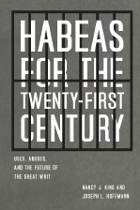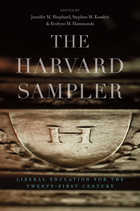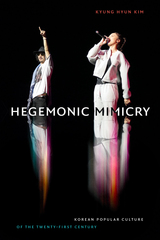6 start with H start with H

For centuries, the writ of habeas corpus has served as an important safeguard against miscarriages of justice, and today it remains at the center of some of the most contentious issues of our time—among them terrorism, immigration, crime, and the death penalty. Yet, in recent decades, habeas has been seriously abused. In this book, Nancy J. King and Joseph L. Hoffmann argue that habeas should be exercised with greater prudence.
Through historical, empirical, and legal analysis, as well as illustrative case studies, the authors examine the current use of the writ in the United States and offer sound reform proposals to help ensure its ongoing vitality in today’s justice system. Comprehensive and thoroughly grounded in a modern understanding of habeas corpus, this informative book will be an insightful read for legal scholars and anyone interested in the importance of habeas corpus for American government.

From Harvard University, one of the world’s preeminent institutions of
liberal education, comes a collection of essays sampling topics at the forefront of academia in the twenty-first century. Written by faculty members at the cutting edge of their fields, including such luminaries as Steven Pinker, Laurel Thatcher Ulrich, and Harry R. Lewis, these essays offer a clear and accessible overview of disciplines that are shaping the culture, and even the world.
The authors, among the most respected members of Harvard’s faculty, invite readers to explore subjects as diverse as religious literacy and Islam, liberty and security in cyberspace, medical science and epidemiology, energy resources, evolution, morality, human rights, global history, the dark side of the American Revolution, American literature and the environment, interracial literature, and the human mind. They summarize key developments in their fields in ways that will both entertain and edify those who seek an education beyond the confines of the classroom.
It is sometimes said that youth is wasted on the young. It could also be said that college, too often, is wasted on college students—that only after graduating does a former student come to appreciate learning. To those wishing to revisit the college classroom—as well as to those who never had the opportunity in the first place—this book gives a taste of the modern course at Harvard. The essays are stimulating and informative, and the annotated bibliographies accompanying each chapter provide invaluable guidance to the life-long learner who wants to pursue these fascinating topics in depth.




The Housing Act of 1949 called for a “decent home and suitable living environment” for every American. The progress toward this goal over the last fifty years is generally a story of success. Kent Colton documents the remarkable progress in the areas of housing production, homeownership, and rental housing, the transformation of the nation’s housing finance system, the role of government, and the place of housing in the economy. However, significant challenges remain and new issues have arisen.
This work looks to the future using case studies developed during the author’s fifteen-year tenure as head of the National Association of Home Builders and includes discussions of real-world problems and the people involved. Highlighting the process of developing and implementing housing policy given the great challenges of working with many diverse interests, the author outlines a housing policy framework based on a set of principles for achieving common ground.
READERS
Browse our collection.
PUBLISHERS
See BiblioVault's publisher services.
STUDENT SERVICES
Files for college accessibility offices.
UChicago Accessibility Resources
home | accessibility | search | about | contact us
BiblioVault ® 2001 - 2024
The University of Chicago Press









